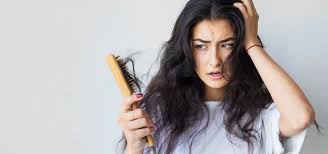1. Genetic Factors (Androgenetic Alopecia):
- Description: The most common cause of hair loss is hereditary, also known as male-pattern or female-pattern baldness. This type of hair loss is influenced by genetics and hormones, leading to gradual thinning of hair. Symptoms: Thinning at the crown or receding hairline in men, or overall thinning of hair in women.
- Pregnancy: Hormonal changes during pregnancy can cause hair to become thicker, but after childbirth, many women experience hair fall due to hormonal shifts. Menopause: During menopause, decreasing estrogen levels can lead to thinning hair. Polycystic Ovary Syndrome (PCOS): This condition causes hormonal imbalances, leading to thinning hair, especially in women. Thyroid Issues: Both hypothyroidism (underactive thyroid) and hyperthyroidism (overactive thyroid) can lead to hair loss due to hormonal imbalances.
- Iron Deficiency: Anemia or low iron levels can lead to hair thinning.Vitamin Deficiencies: Deficiency in vitamins such as Vitamin D, Vitamin B12, biotin, and zinc can lead to hair loss.Poor Diet: Lack of a balanced diet can lead to insufficient nutrients that are essential for healthy hair growth.
- Physical or Emotional Stress: Stress can lead to a condition called telogen effluvium, where hair enters the shedding phase prematurely, resulting in excessive hair fall.Traumatic Events: Major life events like death, divorce, or surgery can also trigger temporary hair loss.
- Alopecia Areata: An autoimmune condition where the immune system attacks hair follicles, leading to bald patches. Scalp Infections: Fungal infections like ringworm can cause hair loss, often leading to patchy bald spots. Lupus: An autoimmune disease that can lead to hair thinning or baldness due to inflammation. Diabetes: High blood sugar levels can contribute to hair loss.
- Chemotherapy: Cancer treatments like chemotherapy often result in temporary hair loss due to their effect on hair follicles .Medications: Certain medications like blood thinners, antidepressants, beta-blockers, and high blood pressure medications can cause hair loss as a side effect .Birth Control Pills: Hormonal contraceptives can sometimes cause hair thinning, especially when starting or discontinuing use.
- Heat Styling: Excessive use of hot styling tools like flat irons, curling irons, and blow dryers can damage hair, leading to breakage and thinning .Chemical Treatments: Frequent use of chemical treatments like hair dyes, perms, and relaxers can weaken the hair shaft and lead to hair fall. Tight Hairstyles: Styles like ponytails, braids, and buns that pull tightly on the hair can cause traction alopecia, a form of hair loss due to constant tension on the hair.
- Pollution: Exposure to pollutants and toxins in the environment can damage hair and lead to hair loss.Sun Damage: Prolonged exposure to the sun’s UV rays can weaken the hair and lead to thinning over time.
- Natural Aging Process: As people age, hair growth naturally slows down, and hair follicles may shrink, leading to finer, thinner hair. This is a normal part of the aging process.
- Washing Too Frequently: Over-washing the hair can strip it of natural oils, leading to dryness, breakage, and hair thinning. Infrequent Washing: Not washing the hair regularly can cause scalp buildup, clogged follicles, and an unhealthy scalp environment that could lead to hair fall.
- Physical Injury: Any trauma to the scalp, such as burns or wounds, can damage hair follicles, resulting in hair loss in the affected area.Surgical Procedures: Surgery, especially in the scalp or body areas with significant hair growth, may lead to temporary or permanent hair loss.
- Alopecia Areata: A condition where the immune system attacks hair follicles, causing sudden and patchy hair loss.Lupus or Rheumatoid Arthritis: These autoimmune diseases can also result in hair loss due to their effects on the body’s immune response.
- Smoking: Smoking can reduce blood circulation to the scalp, leading to poor hair growth and hair fall. Lack of Sleep: Insufficient sleep and irregular sleep patterns can affect overall health, including hair health.
- Chronic Illnesses: Conditions like kidney disease, liver disease, and cancer can cause significant hair loss as a symptom or side effect of treatment. Infections: Severe infections, especially ones that lead to fever, can cause hair to shed.

